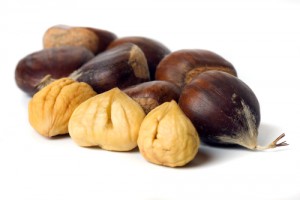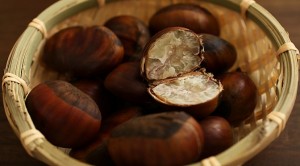Starchy, sweet, rich in flavor, chestnuts are popular edible nuts of the northern hemisphere origin.Chestnuts, unlike other nuts and seeds, are relatively low in calories and fats. Nonetheless, they are rich sources of minerals, vitamins, and phytonutrients that immensely benefit health. Another unique feature of chestnuts is that they primarily compose of starch (carbohydrates) in contrast to other kinds of tree seeds and nuts which are rather high in calorie, protein, and fat. Nevertheless, they are still good sources of minerals, vitamins and some good-quality protein than cereals and tubers.

They are an excellent source of dietary fiber; provide 8.1 g (about 21% of RDI) per 100 g. Fiber diet helps lower blood cholesterol levels by limiting excess cholesterol absorption in the intestines.
They are exceptionally rich in vitamin-C, folates and mono-unsaturated fatty acids.
The nuts are an excellent source of minerals such as iron, calcium, magnesium, manganese, phosphorus and zinc, besides providing a very good amount of potassium (518 mg / 100 g). Potassium counters hypertensive action of sodium, lowers heart rate and blood pressure. Iron helps prevent microcytic anemia. Magnesium and phosphorus are essential components of bone metabolism.

Chestnuts, just like hazelnuts and almonds, etc., are gluten free food items.
Source: www.nutrition-and-you.com